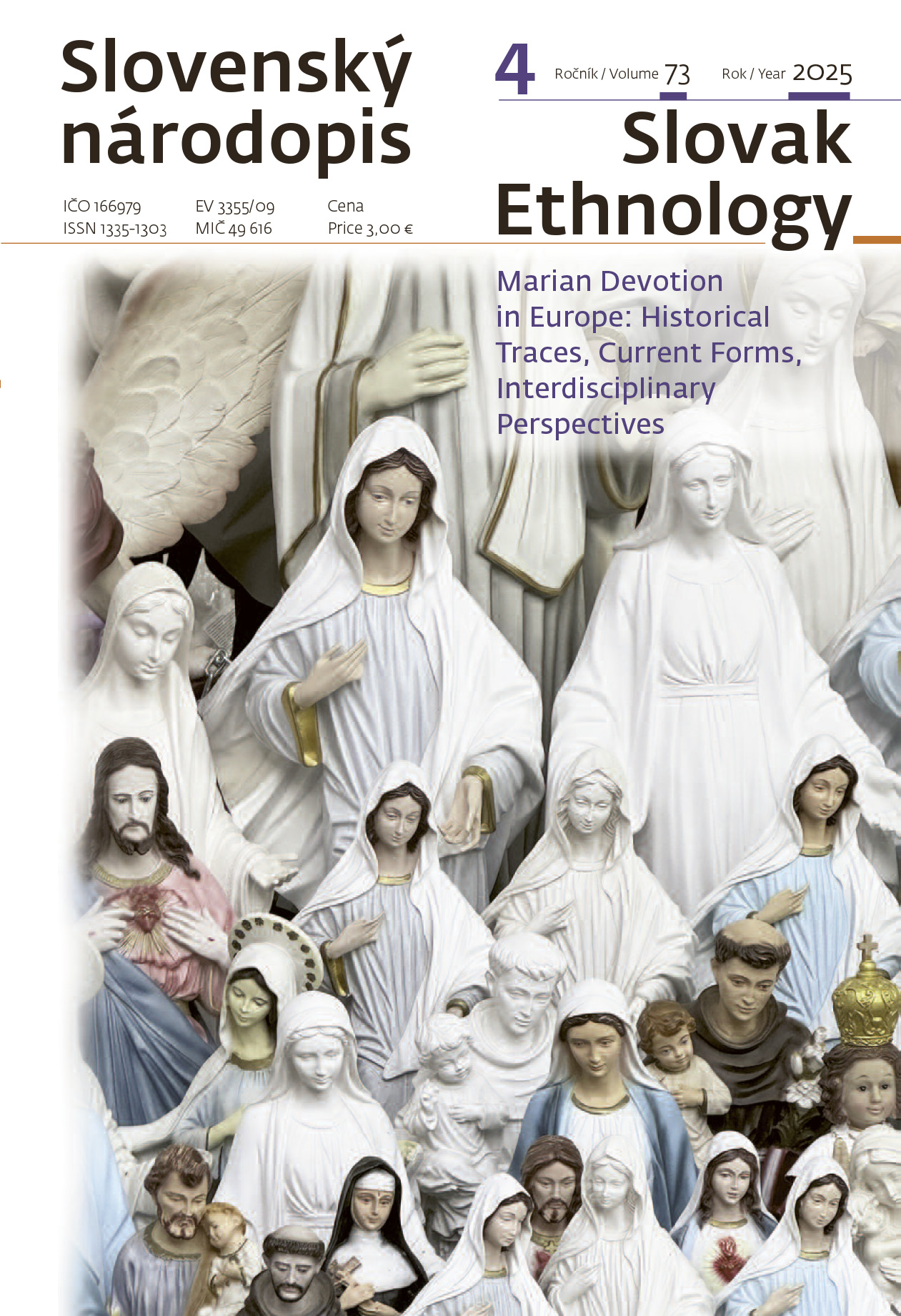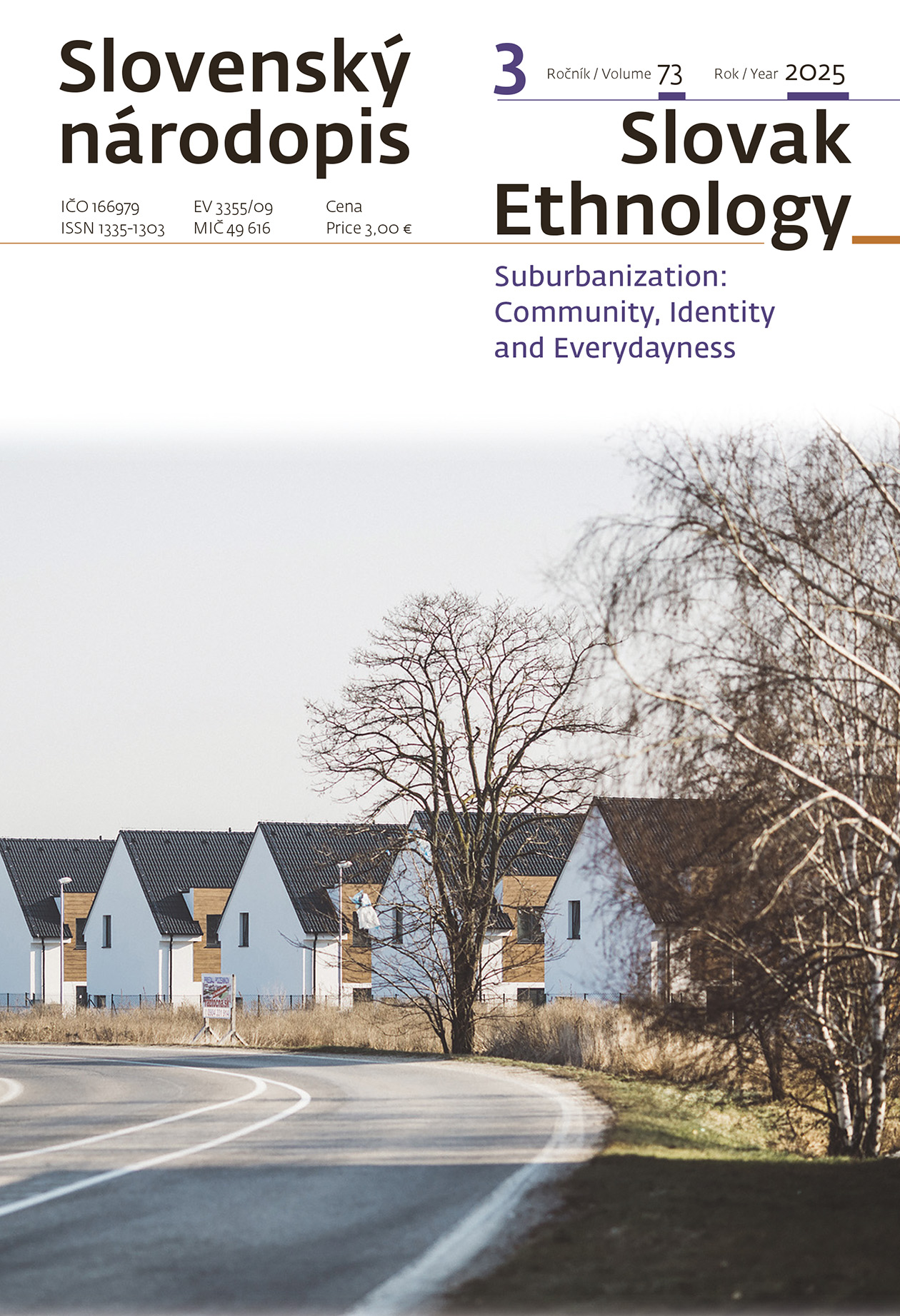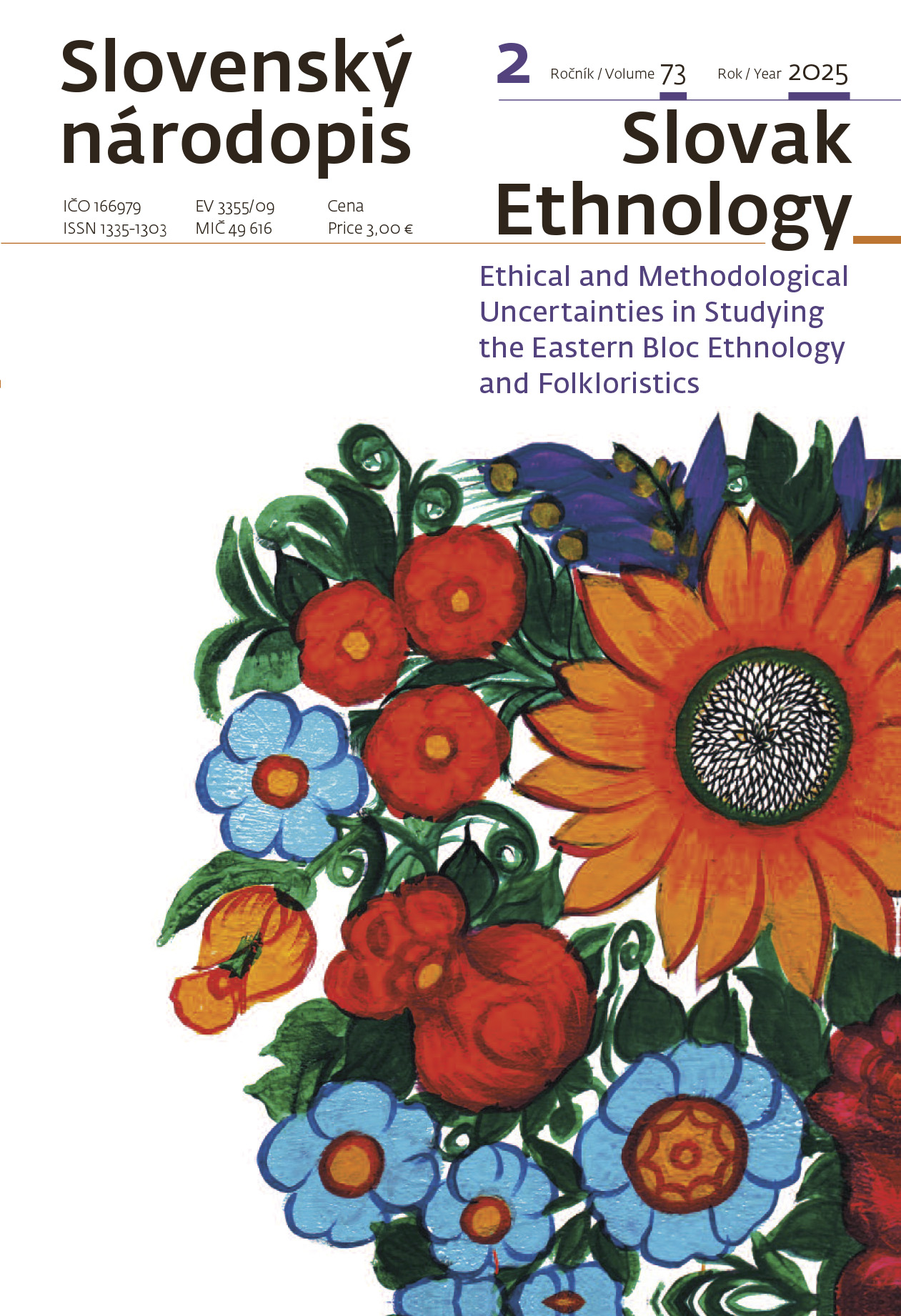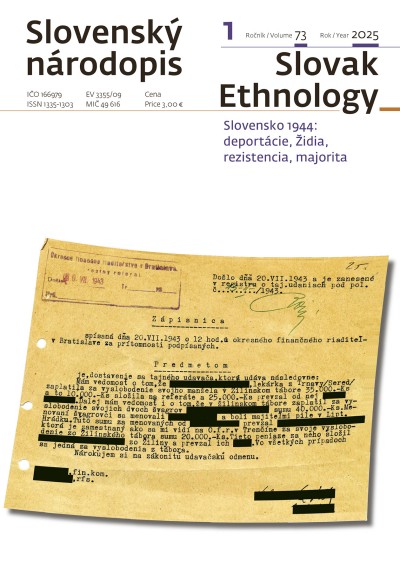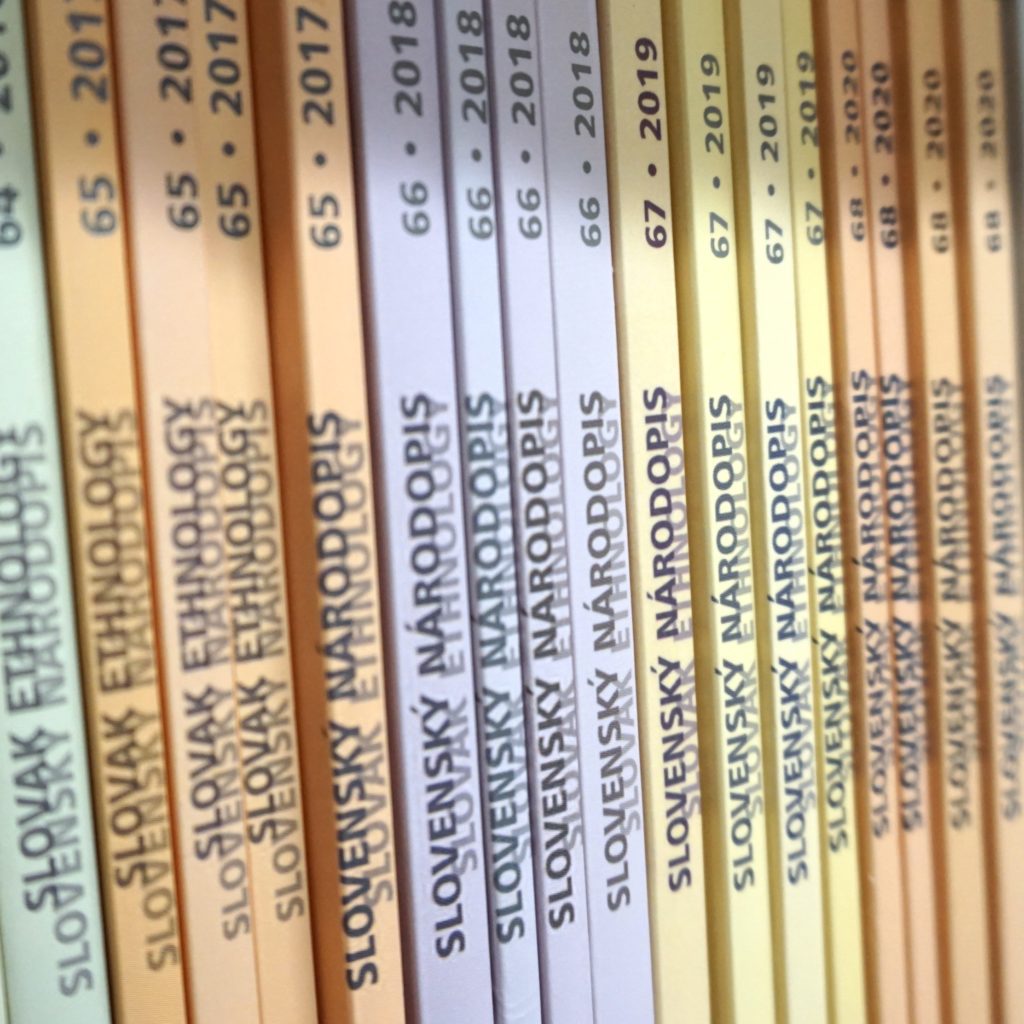
Slovenský národopis
Vydavateľ: Ústav etnológie a sociálnej antropológie SAV, v. v. i.
ISSN 1335-1303 (tlač)
ISSN 1339-9357 (online)
Kontakt
Redakcia Slovenského národopisu
ÚESA SAV, v. v. i.
Klemensova 19
813 64 Bratislava
Tel.: 02 – 52964707, ext. 107
e-mail: slovensky.narodopis@savba.sk
Najnovšie čísla
Slovenský Národopis je evidovaný v nasledujúcich databázach:
Emerging Sources Citation Index of Web of Science (ESCI, WoS), SCOPUS, EBSCO, ProQuest, CEEOL, The Central European Journal of Social Sciences and humanities (CEJSH), Modern Language Association (MLA), Ulrichsweb, Willingspress, Norwegian Centre for Research Data (NSD), European Science Foundation (ESF), European Reference Index for the Humanities and the Social Sciences (ERIH PLUS)
Príspevky uverejnené v časopise sú teritoriálne orientované prevažne na región Strednej Európy. Zameriavajú sa na analýzu sociálnych javov založenú na dátach získaných predovšetkým prostredníctvom metód etnografického terénneho výskum. Redakcia časopisu preferuje príspevky analytického, teoretického alebo syntetizujúceho charakteru, ktoré prispievajú k aktuálnym diskusiám v sociálnych vedách. Tematicky je časopis sústredený najmä (nie však výhradne) na etnický, kultúrny a historický vývin v Strednej Európe, na sociálne a kultúrne aspekty ekonomickej a politickej transformácie, na modernizačné procesy v urbánnom i rurálnom prostredí, na etnickú a menšinovú problematiku, na problémy kultúrneho dedičstva v európskom kontexte, ako aj na dejiny spoločenskovedných disciplín. Okrem problémovo orientovaných vedeckých štúdií časopis uverejňuje tiež eseje, diskusie a recenzie kníh. Časopis poskytuje priestor na diskusie o kľúčových problémoch v sociálnych vedách, ako aj na kritické komentáre k publikovaným príspevkom. Uverejnené štúdie a eseje prešli obojstranne anonymným oponentským konaním, oponenti sa vyberajú z medzinárodného okruhu odborníkov.
Výzvy
Call for papers to the issue of Slovak Ethnology/Slovenský národopis, volume 75, number 4, on the topic Between the Living and the Dead: Ethnological Perspectives on Communication with the Dead
Deadline for submission of the abstracts: 28 February 2026
Deadline for submission of the final manuscripts: 30 June 2026
Peer-reviewing, editing: 1 July 2026 – November 2026
Publication: in December 2026 in SN/SE 4/2026 (ENG)
Guest editors:
Emese Ilyefalvi (DOI: 0000-0001-6677-5843)
Department of Folkloristics, Faculty of Humanities, Eötvös Loránd University & Department of Ethnology and Cultural Anthropology, Faculty of Arts University of Ljubljana, Slovenia
Petra Hamer (DOI: 0009-0002-8255-8632)
Department of Ethnology and Cultural Anthropology, Faculty of Arts, University of Ljubljana, Slovenia
Michal Uhrin (DOI: 0000-0002-8062-5785)
Department of Archaeology and Cultural Anthropology, Faculty of Arts, Comenius University in Bratislava and Department of Ethnology and Cultural Anthropology, Faculty of Arts University of Ljubljana, Slovenia
Between the Living and the Dead: Ethnological Perspectives on Communication with the Dead
Contrary to pre-modern European societies and many contemporary non-Western societies, where the dead were considered members of the community and remained significantly involved in people’s everyday lives, the dominant Western ontology nowadays does not integrate communication and exchange between the living and the dead. However, as a bulk of quantitative and qualitative research attests, for some people in contemporary Western societies, social interactions do not necessarily cease after death but are merely transformed. The dead continue to be involved in the lives of individuals and communities, affecting our thoughts, emotions, values, behaviour, and social relations (Hesz, 2025; Mencej, 2024, 2025; Walter 2019; Klass & Steffen, 2018; Maddrell 2013; Maddrell & Sidaway, 2010).
The aim of this issue of Slovenský národopis/Slovak Ethnology is to examine the different types of interaction between the living and the dead, broadly defined and encompassing both intentional and unintentional communication with the spirits of the dead, both familiar dead and impersonal ghosts, through both collective and private practices. The interactions can consist of communication through dreams and other altered states of consciousness, visions, interactions through mediums or with the help of various other practitioners, ‘legend trips’ and tourism to haunted places, practices of ‘summoning the dead’, various after-death and memorialisation practices, online communication with spirits, and so forth (Bužeková, 2024; Ivnik, 2025; Kiliánová, 2010). Whereas in the past the way of communicating with the dead was primarily prescribed by tradition, religion and/or the state, today individuals are free to engage in their practices without having to adhere to prescribed methods; in the fragmented and networked society of privatised death, they may not even have a community to share their practices with (Bergen, 2019; Bužeková, 2025; Heelas, 1996).
Scope and focus
We invite folklorists, ethnologists, anthropologists, sociologists, psychologists, thanatologists, scholars of bereavement and media studies, as well as researchers from related disciplines concerned with death and the dead in contemporary society, to submit their contributions. Submissions may draw on diverse sources, including ethnographic, archival, digital, and media materials.
We are particularly interested in contributions addressing (but not limited to) the following themes:
- Intentional and unintentional communication with the dead
- Motivations behind communication with the dead (emotional, moral, spiritual, or experiential).
- Maintenance or transformation of personal relationships with deceased
- Social and political functions of these practices, including status, group identity, and power dynamics.
- The role of honouring, commemorating, or seeking guidance and forgiveness from the dead.
- Continuity, decline, or transformation of traditional practices related to the dead.
- Emergence of new forms of interacting with or relating to the dead.
- Importance of material objects and specific places in mediating these interactions.
- Effects of communication with the dead on the everyday lives and social worlds of the living.
Affiliation to a project
This special issue is the outcome of the ERC project The Roles of the Agency of the Dead in the Lives of Individuals in Contemporary Society (ERC project DEAGENCY, № 101095729) funded by the European Union.
Contributors are kindly requested to submit their abstracts and keywords directly through the editorial system of Slovak Ethnology (https://journals.savba.sk/index.php/slovenskynarodopis/about/submission) no later than 28 February 2026.
The final manuscripts are expected no later than 30 June 2026 through the same editorial system.
The manuscripts should not exceed 6,250 words or 45,000 characters, including spaces, notes, and references, and should follow the journal’s guidelines for authors accessible (HERE). The issue will be published at the end of 2026.
Proposal for the SN/SE Issue 3/2026 (ENG)
Deadline for submission of the abstracts: 15 January 2026
Deadline for submission of the final manuscripts: 15 May 2026
Peer-reviewing, editing: 16 May 2026 – September 2026
Publication: in September 2026 in SN/SE 3/2026 (ENG)
Invited co-editor: Stephan Dudeck (Research Institute for Sustainability at GFZ)
Call for papers to the thematic issue of Slovak Ethnology/Slovenský národopis, volume 74, number 3, on the topic Otherness in the (Un)Making: Media Representations of Marginalised People and Communities.
Guest editors:
Jaroslava Panáková, Institute of Ethnology and Social Anthropology, Slovak Academy of Sciences, Slovakia; https://orcid.org/0000-0002-4116-3848
Stephan Dudeck, University of Tartu and Research Institute for Sustainability at GFZ; https://orcid.org/0000-0002-3883-1251
We are delighted to announce the call for proposals for a Thematic Issue of Slovak Ethnology, to be published in September 2026. We invite scholars to submit their abstracts, bringing together theoretically grounded and ethnographically rich contributions that engage with the aligned theme, Otherness in the (Un)Making: Media Representations of Marginalised People and Communities
Drawing on Nichols’s (1992) concept of ethnotopia, this issue interrogates the persistence and transformation of colonial imaginaries – including various forms of mission civilisatrice –across archival, reportage, domestic, and other visual media. Photography offers a critical lens for examining the visual (un)making of otherness in diverse historical, political, and cultural contexts. Across the twentieth and twenty-first centuries, accelerating social, technological, and institutional change has reshaped aesthetic norms and sensory regimes (e.g., Yurchak, 2006; Yamin-Pasternak et al., 2014), altering practices of looking, sensing, and image production. Visual representations simultaneously function as mediating devices, metaphors of broader social worlds, and agents of social and political transformation (Oushakine, 2020), while institutions increasingly intervene in everyday intimacies (Peers, 2019). Such dynamics destabilise long-standing conventions of portraying marginalised individuals and communities.
Examining photographic authorship across ethnographic, journalistic, documentary, domestic, and digital contexts reveals how asymmetries of power, institutional structures, and inherited visual idioms shape the production of otherness. At the same time, self-produced images – whether home photography, self-portraits, or digital self-representations – demonstrate how photographed subjects appropriate, reinterpret, contest, or subvert imposed paradigms.
Existing scholarship addresses photography’s roles in sociality, memory, domesticity, and mobility (Bourdieu et al., 1990; Hirsch, 1997; Radley, 2010), and its entanglements with colonial and post-colonial knowledge regimes (Tagg, 1988; Edwards, 1992, 2012). Yet it often privileges sociological interpretation over close visual analysis or depends heavily on linguistic frameworks (Morton & Edwards, 2009).
In response, this issue invites contributions attentive to visual composition, aesthetic idioms, multimodal contexts, and sensory experience, grounded in reflexive and participatory ethnography. Approaches such as semantic and compositional analysis (Clarke, 2005; Kepes, [1944] 1995), photo elicitation (Panáková, 2019), co-creative and collaborative visual methods, and multimodal analysis offer productive avenues for exploring how images construct, circulate, and potentially decolonise otherness.
This thematic orientation foregrounds the shifting politics of representation and the ways in which marginalised people and communities are produced, mediated, embodied, and contested through visual, digital, and multimodal practices. We particularly welcome work addressing authorship, agency, power asymmetries, (de)colonial imaging, and the interpretative labour through which otherness is continually remade or dismantled.
The special issue is supported by the Grant Agency of the Ministry of Education, Research, Development and Youth of the Slovak Republic and the Slovak Academy of Sciences –VEGA No. 2-0139-24.
Proposal Submission
Contributors are kindly requested to submit their abstracts and keywords directly through the editorial system of Slovak Ethnology (https://journals.savba.sk/index.php/slovenskynarodopis/about/submission) no later than 15th January, 2026.
The final manuscripts are expected no later than 15th May, 2026, through the same editorial system.
They should not exceed 6,250 words or 45,000 characters, including spaces, notes, and references, and should follow the journal’s guidelines for authors accessible (HERE).
Call for papers to the special issue of Slovak Ethnology/Slovenský národopis, volume 74, number 2, on the topic New Challenges for Qualitative Research Methods on Transnational Families in a Changing World
Guest editors:
Esra Demirkol Colosio (ORCID: 0000-0003-2349-2389), Sociology Department at Çankırı Karatekin University, Turkey
Jelena Predojević-Despić (ORCID: 0000-0002-3947-9974), Institute of Social Sciences, Serbia
Martina Wilsch (ORCID: 0000-0002-6502-5503), Institute of Ethnology and Social Anthropology, Slovak Academy of Sciences, Slovakia
The complexities of contemporary social fabrics and their rapid transformations challenge researchers and academics to continuously reflect on methods, research topics, and ethical considerations in new and evolving ways. Research methodologies must adapt to shifting social realities, shaped not only by the needs of research subjects but also by researchers’ own lives and their diverse professional and personal commitments (Günel et al., 2020). A key challenge lies in positioning researchers and social scientists in an era characterized by multiple crises (Das, 2015, 2016). In the post-pandemic world, the intersection of personal and professional experiences underscores the necessity of reflexivity—particularly regarding how researchers’ biographies, experiences of crises, and the disruptions they encounter influence their methodological choices and engagement with interlocutors.
Research on transnational families—typically defined in migration studies as families whose members are physically dispersed across two or more countries yet maintain a sense of familyhood (Bryceson & Vuorela, 2020; Cienfuegos-Illanes & Brandhorst, 2023)—presents a distinct set of methodological challenges. These include engaging with research subjects who may be (im)mobile, geographically distant, or socially vulnerable, as well as those who are familiar or even experts in their own right. While these challenges are complex, they also provide a dynamic and enriching research landscape. As a result, scholars must continually reflect on and refine methodologies such as ethnography, participant observation, multi-sited fieldwork, autoethnography, and other qualitative approaches. Furthermore, academic inquiry rooted in empirical research—whose core purpose is to deepen understanding—demands ongoing methodological and epistemological reflection.
This special issue of Slovak Ethnology critically examines the challenges of conducting qualitative research on transnational families and invites authors to methodologically contribute to the topic by addressing various aspects of this relationship, including the needs of research subjects, researchers’ subjectivities, research ethics, the positionality of researchers, and the specific research contexts surrounding transnational families, while also calling for innovative methodological contributions.
The special issue is collectively organized by COST Action CA21143 Transnational Family Dynamics in Europe (TraFaDy) and also supported by the APVV project VV-MVP-24-0203 Family on the Edge: Current Contexts of Vulnerability and Transnational Family Transformations.
Contributors are kindly requested to submit their abstracts and keywords directly through the editorial system of Slovak Ethnology (https://journals.savba.sk/index.php/slovenskynarodopis/about/submission) no later than June 30, 2025.
The final manuscripts will be expected no later than January 31, 2026 through the same editorial system.
They should not exceed 6,250 words or 45,000 characters, including spaces, notes, and references, and should follow the journal’s guidelines for authors accessible (HERE).
Slovenský národopis/Slovak Ethnology vyzýva na zaslanie príspevkov do pripravovaného čísla 1/2026, ročník 74, zameraného na tému Ľudová zbožnosť: Duchovný svet vidieckeho obyvateľstva
Hosťujúce editorky:
Barbora Turčanová (ORCID: 0000-0001-9970-8946), Ponitrianske múzeum v Nitre
Markéta Holubová (ORCID: 0000-0001-8904-1738), Etnologický ústav Akademie věd ČR, v. v. i.
Z pohľadu etnológie výskum ľudovej religiozity a jej hmotných i nehmotných prejavov nemá v našich podmienkach vo všeobecnosti príliš bohatú históriu. Zostáva tak nepopísaná kultúrnohistorická hodnota mnohých objektov, do nenávratna odchádza poznanie prejavov ľudovej viery v podobe prvkov ústnej tradície, ľudovej slovesnosti, hudobných či výtvarných prejavov, z ktorých mnohé sa pod vplyvom doby menia i vytrácajú.
Koncom roka 2024 Ponitrianske múzeum v Nitre sprístupnilo verejnosti dlhodobú výstavu s názvom Oroduj za nás. Inštalácia nadväzuje na akvizičnú a výskumnú činnosť múzea. Autori výstavy mali zámer predstaviť návštevníkom duchovný svet vidieckeho človeka rímskokatolíckeho vierovyznania z konca 19. storočia s presahmi do toho nasledujúceho, a jeho prejavy ako vo verejnom, tak aj v súkromnom kulte.
Vo všeobecnosti sa náboženský, umelecký i kultúrny fenomén v tradíciách obyvateľov strednej Európy stal mostom medzi historickými obdobiami a spájal ľudí naprieč rôznymi krajinami či regiónmi. S témou ľudovej zbožnosti sú späté hmotné i nehmotné kultúrne prejavy, reprezentujúc mestské i vidiecke prostredie a mnohé z nich sú dodnes nadčasovým odkazom minulých spoločenstiev. Vyznávanie konkrétneho náboženstva v sebe nesie vzorce správania sa v určitých situáciách, ktoré spoločne s vyššie uvedeným predstavujú atraktívny predmet bádania, a to zvlášť na území Slovenska, kde historicky boli a sú i dnes živé viaceré konfesie.
Redakcia časopisu Slovenský národopis na podnet a v spolupráci s Ponitrianskym múzeom v Nitre iniciuje úsilie prispieť k širšiemu poznaniu uvedenej témy, k výmene a popularizácii vedeckých poznatkov a informácií z danej oblasti, a preto sa rozhodla venovať pozornosť tejto problematike v samostatnom čísle časopisu 1/2026.
Privítame štúdie alebo eseje etnológov, antropológov, historikov, historikov umenia, odborníkov z oblasti pamiatkovej starostlivosti, ako i z iných spoločenskovedných disciplín, ktorí sa v rámci svojho výskumu zaoberajú:
- osobnými a kolektívnymi (verejnými) náboženskými úkonmi a praktikami,
- sakrálnymi stavbami, sakrálnymi priestormi a sakrálnymi pamiatkami v krajine,
- púťami, pútnickými miestami, sviatkami a rituálmi,
- slovesnými, hudobnými, výtvarnými prejavmi spätými s náboženskými praktikami.
Príspevky budú uverejnené v slovenskom/českom jazyku.
Termín zaslania abstraktov: 31. máj 2025
Prosíme prispievateľov, aby abstrakty v slovenčine a v češtine posielali priamo do redakčného systému Slovenského národopisu na adresu:
https://journals.savba.sk/index.php/slovenskynarodopis/about/submissions
Termín dodania príspevkov: 30. november 2025
Prosíme prispievateľov, aby príspevky posielali priamo do redakčného systému Slovenského národopisu na adresu:
https://journals.savba.sk/index.php/slovenskynarodopis/about/submissions
Informácie pre autorov: text príspevku by nemal presiahnuť 6,250 slov alebo 45,000 znakov s medzerami, vrátane poznámok a zoznamu literatúry a mal by rešpektovať Pokyny pre prispievateľov. Podrobnosti nájdete TU.
Redakcia
Hlavná redaktorka
Zástupkyňa hlavnej redaktorky
Redaktori
Vladimír Potančok
Peter Maňo (redaktor recenzií)
Redakčná rada
Regina Bendix (Univerzita Georga Augusta v Göttingene, Nemecko), Michał Buchowski (Univerzita Adama Miczkiewicza v Poznani, Poľsko), Dušan Deák (Univerzita Komenského v Bratislave, Slovensko), Ingrid Slavec Gradišnik (Slovinská akadémia vied a umení, Ľubľana, Slovinsko), Juraj Hamar (Univerzita Komenského v Bratislave, Slovensko), Hana Hlôšková (Slovenská akadémia vied, Slovensko), Miloš Hubina (Mahidolova univerzita, Bangkok, Thajsko), Gabriela Kiliánová (Slovenská akadémia vied, Slovensko), Ullrich Kockel (Univerzita Škótskej vysočiny a ostrovov, Veľká Británia), Sam Pack (Kenyon College, Gambier, Ohio, USA), Vladimir Penčev (Bulharská akadémia vied, Sofia, Bulharsko), Dragana Radojičić (Srbská akadémia vied a umení, Belehrad, Srbsko), Klaus Roth (Univerzita Ludwiga Maximiliana v Mníchove, Nemecko), Peter Salner (Slovenská akadémia vied v Bratislave, Slovensko), Martin Šimša (Národní ústav lidové kultury, Strážnice, Česko), Zdeněk Uherek (Akademie věd České republiky, Praha, Česko), Jelena S. Uzeneva (Ruská akadémia vied, Moskva, Rusko), Helena Wulff (Štokholmská univerzita, Švédsko)
Digitálny archív časopisu
Ročníky časopisu 1953 – 2012 boli zdigitalizované prostredníctvom Centra vedecko-technických informácií Slovenskej republiky (CVTI SR). V digitálnom archíve sme sprístupnili ich obsah vrátane novších ročníkov, pričom verejne prístupné v .pdf formáte sú len tie texty, na zverejnenie ktorých má Ústav etnológie a sociálnej antropológie SAV. v. v. i. licenčné práva podľa autorského zákona.
Online digitálny archív Slovenského národopisu
Vyhľadávanie v digitálnom archíve Slovenského národopisu
Bibliografia Slovenského národopisu (1953-2002)
Pokyny pre prispievateľov
Redakcia prijíma rukopisy na zváženie s predpokladom, že texty predstavujú pôvodný materiál, neboli už publikované alebo sa nechystajú byť publikované v inom zdroji. Podrobnejšie informácie o pokynoch pre prispievateľov, pravidlách prijímania rukopisov, o recenznom konaní a pravidlách citovania nájdete nižšie v sekcii Na stiahnutie.
Publikovanie v časopise nie je spojené so žiadnymi autorskými poplatkami, autori sú však pred publikovaním zodpovední za zabezpečenie anglickej jazykovej korektúry svojho rukopisu, ktorú plne uhrádzajú. Jazykovú korektúru zabezpečuje spoločnosť Ebor Editing, pokiaľ nebude s hosťujúcimi editormi a redakciou dohodnuté inak. Odporúčame autorstvu, aby spoločnosť Ebor Editing kontaktovali v dostatočnom predstihu. Redakcia vydá potvrdenie (akceptačný list) o prijatí článku do tlače na vyžiadanie autora až po odovzdaní finálnej verzie príspevku po úspešnom recenznom konaní a po jazykovej korektúre.
Vyhlásenie o voľnom prístupe
Časopis Slovenský národopis/Slovak Ethnology je časopis s voľným prístupom podľa definície BOAI, pričom jednotlivé autorské texty podliehajú verejnej licencii CC-BY. Obsah časopisu je voľne dostupný na verejnom internete, pričom každému užívateľovi je bezplatne povolené kopírovať alebo rozširovať jeho obsah, čítať, sťahovať, kopírovať, distribuovať, tlačiť, vyhľadávať alebo odkazovať na plné texty článkov, a to bez vyžiadania predchádzajúceho povolenia od vydavateľa alebo autora. Obsah môže byť použitý na akýkoľvek účel, vrátane komerčného.
Publikačná etika a prax
Slovenský národopis vyžaduje vysoké štandardy v publikačnej etike a v zamedzení porušovania publikačnej praxe. Publikuje etické pravidlá určené autorom, recenzentom, redaktorom a vydavateľovi. Časopis prijíma len pôvodné rukopisy, ktoré neboli už predtým publikované alebo nie sú v tom čase zaslané inému vydavateľovi, sú napísané uvádzanými autormi, neobsahujú nezákonné vyhlásenia, neporušujú práva iných a náležite citujú zdroje. Redakcia používa pri kontrole rukopisov antiplagiátorský softvér. Recenzné konanie je anonymné. Recenzenti by nemali mať konflikty záujmov voči posudzovaným článkom. Ich rozhodnutia by mali byť objektívne. Redaktori a vydavateľ musia vykonávať všetky kroky potrebné na zaručenie kvality vydávaných článkov. Prípadné problémy naši redaktori riešia v súlade s dokumentom Publishing Ethics Resource Kit vytvoreným spoločnosťou Elsevier. Viac informácií o dodržiavaní publikačnej etiky a o publikačnej praxi nájdete nižšie v sekcii Na stiahnutie.
Autori sú plne zodpovední za integritu a originalitu svojej práce. Všetok obsah vygenerovaný prostredníctvom alebo s pomocou nástrojov a technológií umelej inteligencie musí byť v záverečnej fáze skontrolovaný a upravený autormi a autorkami tak, aby bola zabezpečená presnosť, úplnosť a férovosť. Uvedené technológie nesmú nahrádzať najdôležitejšie autorské úlohy, ako je písanie vedeckých textov alebo interpretácia údajov. Zneužívanie nástrojov umelej inteligencie na falšovanie údajov, plagiátorstvo obsahu alebo generovanie falošných citácií je prísne zakázané.
Objednávky a predplatné
Objednávky a predplatné sa týkajú iba tlačenej verzie časopisu. Časopis je možné objednať si na tejto adrese:
SAP – Slovak Academic Press, s. r. o.,
Bazová 2
821 08 Bratislava
e-mail: sap@sappress.sk
